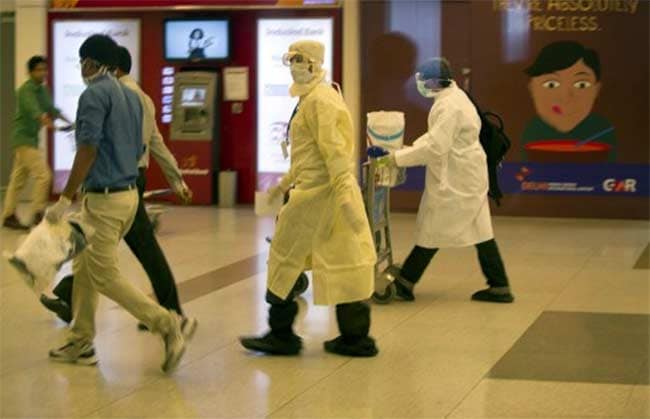
In the last 17 days, over 15,000 people have been screened at the country's airports for the Ebola virus. The Bombay High Court has now asked the Centre and the Maharashtra government what steps are being taken to prevent the entry and spread of the virus in India.
Following are the latest developments:
Earlier this week, elaborate precautionary mechanisms were set up in airports to screen passengers coming from Ebola-hit countries. The measures include medical teams, thermal scanners to detect fever and quarantine facilities.
Health officials are conducting follow-up checks for three weeks in case a passenger had come into contact with Ebola-affected people, but did not show symptoms of the disease.
Over the last 24 hours, 126 passengers from the affected countries have been screened at airports. Of them, three persons who came from Sierra Leone are under observation in Delhi. The rest have tested negative for the virus.
The maximum number of screenings were carried out at Mumbai, 57, and Delhi, 46. Most of the passengers screened belong to Maharashtra, Kerala and Tamil Nadu. The state governments have been requested to ensure tracking and monitoring of passengers.
The Union Health ministry announced on Wednesday that there's no case of Ebola in India.
In Africa, meanwhile, the toll from the disease has crossed 1,500. Liberia has recorded 624 deaths. Guinea, where the outbreak was first detected, has reported 406 deaths, Sierra Leone 392 and Nigeria has reported five.
The World Health Organisation, or WHO, has warned that the number of cases could cross 20,000 before the outbreak can be stemmed.
Most airlines have discontinued service to the three countries hit worst by the virus -- Liberia, Sierra Leone and Guinea.
Air France has suspended its services to Sierra Leone. British Airways stopped flights to Sierra Leone's Freetown and Liberia's Monrovia until next year. But WHO has said it could hamper the efforts to fight the disease.
The vaccine trials, meanwhile, could begin as early as September. The fast-tracking was announced by GlaxoSmithKline, which is developing the vaccine, and Britain-based medical charity Wellcome Trust, which is contributing to a grant for the trials.

